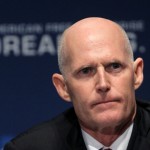Seven Education Leaders To Watch In Tallahassee

The Florida House of Representatives
Rep. Will Weatherford is the next Florida House Speaker. The Pasco County Republican also was involved in trying to open a rejectd Pasco County charter school.
When the Legislative session opens next month, expect these folks to make the most news — or maybe just the most noise.
Gov. Rick Scott — Scott got much of what he wanted last year. The first bill he signed into law — with a press event at a charter school — required statewide teacher evaluations.
This year Scott has thrown out two markers: He’d like $1 billion added to K-12 budgets and he wants state universities to graduate students in fields which expect job growth, such as math, science and engineering.
Legislative leaders have been lukewarm on Scott’s budget proposal so far.
Scott, a Republican, is among the most unpopular governors in the country, which could give the Legislature some cover to ignore his priorities.
Education Commissioner Gerard Robinson — He’s only been on the job a few months but he’s already set a tone.
Robinson disregarded the recommendations of a panel of educators, business leaders and others and recommended a higher required score on the high school reading portion of the Florida Comprehensive Assessment Test.
The higher score was supported by former Gov. Jeb Bush, causing some state school superintendents to wonder if Robinson was feeling political pressure from Bush. Robinson sternly brushed those criticisms aside and said he made his decision based on data.
Robinson is Gov. Rick Scott’s top lieutenant on education issues, so keep an eye on if he weighs in on legislation or the state budget.
Sen. J.D. Alexander — Alexander is chairman of the Senate budget committee and gets a big say in setting state spending priorities.
Alexander has been pushing for the University of South Florida – Poly campus in Polk County to become an independent university. That move have been opposed by University of South Florida president Judy Genshaft and others.
If Alexander wants to fast-track an independent Polk County university, the budget is one way to make that happen. Alexander could also punish those who opposed the plan in the budget.
Sen. Larcenia Bullard — The South Florida Democrat is the leading opponent to the Florida model of education overhaul.
Bullard has filed a bill that would end the FCAT, a foundation for evaluating district, school and teacher performance.
Bullard has also filed a bill that would require charter schools to maintain a website detailing school leadership and ties to management companies.
Rep. Will Weatherford – The next Speaker of the Florida House, Weatherford will have a big say in what legislation gets through the House.
Weatherford, a Republican, has been active in education issues. He is chairman of the House Education Policy Council.
He is also a member of the board of a proposed Pasco County charter school. The school board rejected the application.
Earlier this year Tampa-area school leaders asked Weatherford to take a year off from any significant education changes, following last year’s law requiring teacher evaluations and ending long-term teacher contracts.
Sen. Stephen Wise — The Jacksonville Republican is chairman of the Senate Education Pre-K – 12 committee and will play a key role in any new education policies.
Wise has introduced a bill that would require school districts to call the annual time off at the end of December “Christmas Break” instead of Winter break.
Wise is also co-sponsor of a bill that would increase the tax credits available for businesses who donate scholarships for low-income students to attend private schools.
Sen. Bill Montford — Montford is a top Senate Democrat and leads the Florida Association of District School Superintendents in his day job.
Montford has introduced a bill allowing advertising on school buses.


